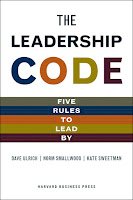Leaders create a credible and hopeful image of a future for everyone
who needs to invest. The also connect the future to the present by
turning aspirations into action. Effective leaders gauge when their focus
needs to be on architecting the organization and its capabilities, and
when it needs to shift to individuals and their abilities.
If you want the basics on leadership, The Leadership Code: Five Rules To Lead By; By Dave Ulrich, Norm Smallwood, Kate Sweetman; is the book for you. Drawing on decades of research, Ulrich and his team set out to crack the code on leadership. They interviewed thought leaders in the field of leadership and discovered five essentials of leadership that were repeated again and again.
Here are their five rules of leadership:
1. Leaders Shape the Future
It is the leader’s job to be the strategist for their organization setting the direction for the future. A strategist answers the question, “Where are we going” providing both the compelling vision for that future but also the practical and pragmatic way to reach that desired future.
2. Leaders Make Things Happen
A leader must also be an executor answering the question, “How will we make sure we get to where we are going?” Executors translate strategy into action understanding how to make change happen, assign accountability, delegate, and make sure teams work together. They know how to put systems and disciplines in place to get things done.
3. Leaders Engage Today’s Talent
A leader is a “talent manager” identifying, building, and engaging talent to get results now. They draw talent to their organizations, develop people, engage them, and ensure that employees want to do their best. Great leaders inspire an intense loyalty from their team both personally and professionally. They support and inspire people to grow and develop for the good of the organization.
4. Leaders Build the Next Generation
Leaders are passionate and intentional people developers. They can answer this question, “Who stays and sustains the organization for the next generation?” Ulrich and team call this Human Capital Developers. Great leaders ensure that their organization will outlive any single individual, including themselves. They are intentionally looking at long term competencies required for future strategic success. They want future leaders to be successful.
5. Leaders Invest in Themselves
Personal proficiency is at the heart of the leadership code. Effective leaders inspire loyalty in others because they act with integrity and trust. They are aggressive learners seeking to excel in leadership and strengthen those areas where they may be weaker.
This book serves as a guidebook to help readers be better leaders themselves and simultaneously help them build better leadership in their organizations. This is one of the best leadership books I have read. The book is well-written, engaging and pragmatic. If you love to study and learn and challenge yourself, this book is a must-read.
 A Lean Journey
A Lean Journey 






Leave a Comment
Your email address will not be published. Required fields are marked with *